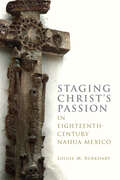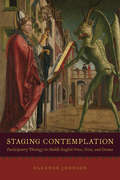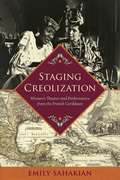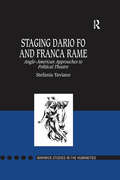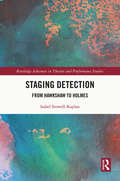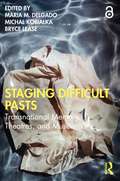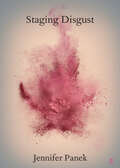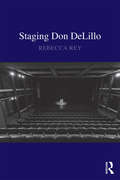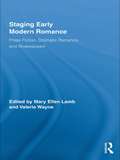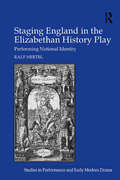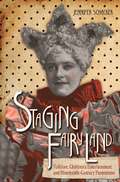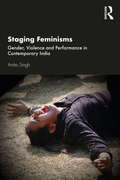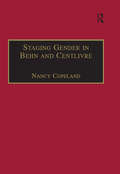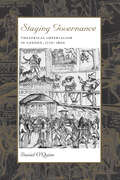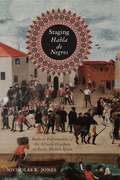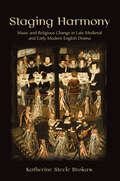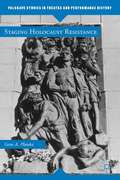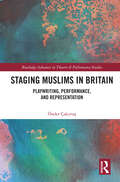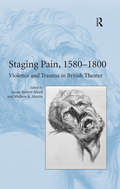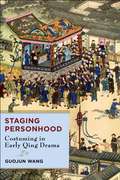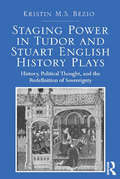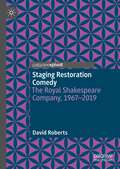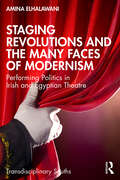- Table View
- List View
Staging Christ's Passion in Eighteenth-Century Nahua Mexico (IMS Monograph Series)
by Louise M. BurkhartStaging Christ’s Passion in Eighteenth-Century Nahua Mexico explores the Passion plays performed in Nahuatl (Aztec) by Indigenous Mexicans living under Spanish colonial occupation. Though sourced from European writings and devotional practices that emphasized the suffering of Christ and his mother, this Nahuatl theatrical tradition grounded the Passion story in the Indigenous corporate community. Passion plays had courted controversy in Europe since their twelfth-century origin, but in New Spain they faced Catholic authorities who questioned the spiritual and intellectual capacity of Indigenous people and, in the eighteenth century, sought to suppress these performances. Six surviving eighteenth-century scripts, variants of an original play possibly composed early in the seventeenth century, reveal how Nahuas passed along this model text while modifying it with new dialogue, characters, and stage techniques. Louise M. Burkhart explores the way Nahuas merged the Passion story with their language, cultural constructs, social norms, and religious practices while also responding to surveillance by Catholic churchmen. Analytical chapters trace significant themes through the six plays and key these to a composite play in English included in the volume. A cast with over fifty distinct roles acted out events extending from Palm Sunday to Christ’s death on the cross. One actor became a localized embodiment of Jesus through a process of investiture and mimesis that carried aspects of pre-Columbian materialized divinity into the later colonial period. The play told afar richer version of the Passion story than what later colonial Nahuas typically learned from their priests or catechists. And by assimilating Jesus to an Indigenous, or macehualli, identity, the players enacted a protest against colonial rule. The situation in eighteenth-century New Spain presents both a unique confrontation between Indigenous communities and Enlightenment era religious reformers and a new chapter in an age-old power game between popular practice and religious orthodoxy. By focusing on how Nahuas localized the universalizing narrative of Christ’s Passion, Staging Christ’s Passion in Eighteenth-Century Nahua Mexico offers an unusually in-depth view of religious life under colonial rule. Burkhart’s accompanying website also makes available transcriptions and translations of the six Nahuatl-language plays, four Spanish-language plays composed in response to the suppression of the Nahuatl practice, and related documentation, providing a valuable resource for anyone interested in consulting the original material. Comments restricted to single page plays composed in response to the suppression of the Nahuatl practice, and related documentation, providing a valuable resource for anyone interested in consulting the original material
Staging Contemplation: Participatory Theology in Middle English Prose, Verse, and Drama
by Eleanor JohnsonWhat does it mean to contemplate? In the Middle Ages, more than merely thinking with intensity, it was a religious practice entailing utter receptiveness to the divine presence. Contemplation is widely considered by scholars today to have been the highest form of devotional prayer, a rarified means of experiencing God practiced only by the most devout of monks, nuns, and mystics. Yet, in this groundbreaking new book, Eleanor Johnson argues instead for the pervasiveness and accessibility of contemplative works to medieval audiences. By drawing together ostensibly diverse literary genres—devotional prose, allegorical poetry, cycle dramas, and morality plays—Staging Contemplation paints late Middle English contemplative writing as a broad genre that operated collectively and experientially as much as through radical individual disengagement from the world. Johnson further argues that the contemplative genre played a crucial role in the exploration of the English vernacular as a literary and theological language in the fifteenth century, tracing how these works engaged modes of disfluency—from strained syntax and aberrant grammar, to puns, slang, code-switching, and laughter—to explore the limits, norms, and potential of English as a devotional language. Full of virtuoso close readings, this book demonstrates a sustained interest in how poetic language can foster a participatory experience of likeness to God among lay and devotional audiences alike.
Staging Conventions in Medieval English Theatre
by Philip ButterworthHow was medieval English theatre performed? Many of the modern theatrical concepts and terms used today to discuss the nature of medieval English theatre were never used in medieval times. Concepts and terms such as character, characterisation, truth and belief, costume, acting style, amateur, professional, stage directions, effects and special effects are all examples of post-medieval terms that have been applied to the English theatre. Little has been written about staging conventions in the performance of medieval English theatre and the identity and value of these conventions has often been overlooked. In this book, Philip Butterworth analyses dormant evidence of theatrical processes such as casting, doubling of parts, rehearsing, memorising, cueing, entering, exiting, playing, expounding, prompting, delivering effects, timing, hearing, seeing and responding. All these concerns point to a very different kind of theatre to the naturalistic theatre produced today.
Staging Creolization: Women's Theater and Performance from the French Caribbean (New World Studies)
by Emily SahakianIn Staging Creolization, Emily Sahakian examines seven plays by Ina Césaire, Maryse Condé, Gerty Dambury, and Simone Schwarz-Bart that premiered in the French Caribbean or in France in the 1980s and 1990s and soon thereafter traveled to the United States. Sahakian argues that these late-twentieth-century plays by French Caribbean women writers dramatize and enact creolization—the process of cultural transformation through mixing and conflict that occurred in the context of the legacies of slavery and colonialism.Sahakian here theorizes creolization as a performance-based process, dramatized by French Caribbean women’s plays and enacted through their international production and reception histories. The author contends that the syncretism of the plays is not a static, fixed creole aesthetics but rather a dynamic process of creolization in motion, informed by history and based in the African-derived principle that performance is a space of creativity and transformation that connects past, present, and future.
Staging Dario Fo and Franca Rame: Anglo-American Approaches to Political Theatre (Warwick Studies in the Humanities)
by Stefania TavianoThis is the first extended treatment of the English translations, stagings, and reception of the political plays of Dario Fo and Franca Rame. Focusing on the United Kingdom and the United States, Stefania Taviano offers a critique of the cultural stereotyping and political conservatism that have pursued these playwrights in translation and argues for the possibility of remaining true to Fo and Rame's political commitment while preserving the comic nature of their plays. Taviano shows how the choices made by the translators and stagers of Fo and Rame's political theatre reveal attitudes toward foreign cultures and theatre generally and Italy in particular. Among the questions she poses are 'What characterizes the process of acculturation that takes place when political theatre is transposed from one culture to another?' 'To what extent are images of foreign literary production affected by dominant translation practices and theatre traditions?' Perhaps most important, 'What constitutes political theatre in a given society, and how are such definitions used to categorize and contain theatre texts that are disturbing, challenging, and difficult to stage?' Her book concludes with an investigation of the meaning of Fo and Rame's political theatre today that points the way for future critical studies of the politics behind the translation and stage production of political theatre outside its culture of origin.
Staging Detection: From Hawkshaw to Holmes (Routledge Advances in Theatre & Performance Studies)
by Isabel Stowell-KaplanStaging Detection reveals how the new figure of the stage detective emerged in nineteenth-century Britain. The first book to explore the productive intersections between detection and performance across a range of Victorian plays, Staging Detection foregrounds the role of the stage detective in shaping important theatrical modes of the period, from popular melodrama to society comedy. Beginning in 1863 with Tom Taylor’s blockbuster play, The Ticket-of-Leave Man, the book criss-crosses London following the earliest performances of stage detectives. Centring the work of playwrights, novelists, critics and actors, from Sarah Lane and Horace Wigan to Wilkie Collins and Oscar Wilde, Staging Detection sheds new light on Victorian acting styles, furthers our understanding of melodrama, and resituates the famous Wildean dandy as a successor to the stage detective. Drawing on histories of masculinity and gender performance as well as developing scientific theory and nineteenth-century visual culture, Staging Detection shows how the earliest stage portrayals of the detective shaped broader Victorian debates concerning fraud, omniscience and earned authority. This book will be of great interest to students and scholars of theatre history, Victorian literature and popular culture – as well as anyone with an interest in the figure of the detective.
Staging Difficult Pasts: Transnational Memory, Theatres, and Museums
by Michal Kobialka Maria M. Delgado Bryce LeaseThis collection of original essays brings together museum, theatre, and performance case studies with a focus on their distinctive and overlapping modes of producing memory for transnational audiences. Whether this is through narrative, object, embodied encounter or a combination of the three, this volume considers distinctions and interactions between memory and history specifically through the lenses of theatre and performance studies, visual culture, and museum and curator studies. This book is underpinned by three areas of research enquiry: How are contemporary theatre makers and museum curators staging historical narratives of difficult pasts? How might comparisons between theatre and museum practices offer new insights into the role objects play in generating and representing difficult pasts? What points of overlap, comparison, and contrast among these constructions of history and memory of authoritarianism, slavery, colonialism, genocide, armed conflict, fascism, and communism might offer an expanded understanding of difficult pasts in these transnational cultural contexts? This collection is designed for any scholar of its central disciplines, as well as for those interested in cultural geography, memory studies, and postcolonial theory. The Open Access version of this book, available at http://www.taylorfrancis.com, has been made available under a Creative Commons Attribution-NoDerivatives (CC-BY-ND) 4.0 license.
Staging Disgust: Rape, Shame, and Performance in Shakespeare and Middleton (Elements in Shakespeare Performance)
by Jennifer PanekThis Element turns to the stage to ask a simple question about gender and affect: what causes the shame of the early modern rape victim? Beneath honour codes and problematic assumptions about consent, the answer lies in affect, disgust. It explores both the textual "performance" of affect, how literary language works to evoke emotions and the ways disgust can work in theatrical performance. Here Shakespeare's poem The Rape of Lucrece is the classic paradigm of sexual pollution and shame, where disgust's irrational logic of contamination leaves the raped wife in a permanent state of uncleanness that spreads from body to soul. Staging Disgust offers alternatives to this depressing trajectory: Middleton's Women Beware Women and Shakespeare's Titus Andronicus perform disgust with a difference, deploying the audience's revulsion to challenge the assumption that a raped woman should “naturally” feel intolerable shame.
Staging Don DeLillo
by Rebecca ReyThe first book-length study to focus on Don DeLillo's plays, Staging Don DeLillo brings the author's theatre works to the forefront. Rebecca Rey explores four central themes that emerge across DeLillo's theatre oeuvre: the centrality of language; the human fear of death; the elusiveness of truth; and the deceptive, slippery nature of personal identity. Rey examines all seven of DeLillo's plays chronologically: "The Engineer of Moonlight" (1979), The Day Room (1986), the one-minute plays "The Rapture of the Athlete Assumed Into Heaven" (1990), and "The Mystery at the Middle of Ordinary Life" (2000), Valparaiso (1999), Love-Lies-Bleeding (2006), and The Word for Snow (2014). Written in clear, accessible language, and interweaving critique of DeLillo's novels throughout, this book will appeal not only to DeLillo scholars but also to anyone working on contemporary literature and drama.
Staging Early Modern Romance: Prose Fiction, Dramatic Romance, and Shakespeare (Routledge Studies in Renaissance Literature and Culture)
by Valerie Wayne Mary Ellen LambThis collection recovers the continuities between three forms of romance that have often been separated from one another in critical discourse: early modern prose fiction, the dramatic romances staged in England during the 1570s and 1580s, and Shakespeare’s late plays. Although Pericles, Cymbeline, Winter’s Tale, and The Tempest have long been characterized as "romances," their connections with the popular prose romances of their day and the dramatic romances that preceded them have frequently been overlooked. Constructed to explore those connections, this volume includes original essays that relate at least one prose or dramatic romance to an English play written from 1570 to 1630. The introduction explores the use of the term "dramatic romance" over several centuries and the commercial association between print culture, gender, and drama. Eight essays discuss Shakespeare’s plays; three more examine plays by Beaumont, Fletcher, and Massinger. Other authors treated at some length include Boccaccio, Christine de Pizan, Chaucer, Sidney, Greene, Lodge, and Wroth. Barbara Mowat’s afterword considers Shakespeare’s use of Greek romance. Written by foremost scholars of Shakespeare and early modern prose fiction, this book explores the vital cross-currents that occurred between narrative and dramatic forms of Greek, medieval, and early modern romance.
Staging England in the Elizabethan History Play: Performing National Identity (Studies In Performance And Early Modern Drama Ser.)
by Ralf HertelApplying current political theory on nationhood as well as methods established by recent performance studies, this study sheds new light on the role the public theatre played in the rise of English national identity around 1600. It situates selected history plays by Shakespeare and Marlowe in the context of non-fictional texts (such as historiographies, chorographies, political treatises, or dictionary entries) and cultural artefacts (such as maps or portraits), and thus highlights the circulation, and mutation, of national thought in late sixteenth-century culture. At the same time, it goes beyond a New Historicist approach by foregrounding the performative surplus of the theatre event that is so essential for the shaping of collective identity. How, this study crucially asks, does the performative art of theatre contribute to the dynamics of the formation of national identity? Although theories about the nature of nationalism vary, a majority of theorists agree that notions of a shared territory and history, as well as questions of religion, class and gender play crucial roles in the shaping of national identity. These factors inform the structure of this book, and each is examined individually. In contrast to existing publications, this inquiry does not take for granted a pre-existing national identity that simply manifested itself in the literary works of the period; nor does it proceed from preconceived notions of the playwrights’ political views. Instead, it understands the early modern stage as an essentially contested space in which conflicting political positions are played off against each other, and it inquires into how the imaginative work of negotiating these stances eventually contributed to a rising national self-awareness in the spectators.
Staging Fairyland: Folklore, Children's Entertainment, and Nineteenth-Century Pantomime (Series in Fairy-Tale Studies)
by Jennifer SchackerIn nineteenth-century Britain, the spectacular and highly profitable theatrical form known as "pantomime" was part of a shared cultural repertoire and a significant medium for the transmission of stories. Rowdy, comedic, and slightly risqué, pantomime productions were situated in dynamic relationship with various forms of print and material culture. Popular fairy-tale theater also informed the production and reception of folklore research in ways that are often overlooked. In Staging Fairyland: Folklore, Children’s Entertainment, and Nineteenth-Century Pantomime, Jennifer Schacker reclaims the place of theatrical performance in this history, developing a model for the intermedial and cross-disciplinary study of narrative cultures. The case studies that punctuate each chapter move between the realms of print and performance, scholarship and popular culture. Schacker examines pantomime productions of such well-known tales as "Cinderella," "Little Red Riding Hood," and "Jack and the Beanstalk," as well as others whose popularity has waned—such as, "Daniel O’Rourke" and "The Yellow Dwarf." These productions resonate with traditions of impersonation, cross-dressing, literary imposture, masquerade, and the social practice of "fancy dress." Schacker also traces the complex histories of Mother Goose and Mother Bunch, who were often cast as the embodiments of both tale-telling and stage magic and who move through various genres of narrative and forms of print culture. These examinations push at the limits of prevailing approaches to the fairy tale across media. They also demonstrate the degree to which perspectives on the fairy tale as children's entertainment often obscure the complex histories and ideological underpinnings of specific tales. Mapping the histories of tales requires a fundamental reconfiguration of our thinking about early folklore study and about "fairy tales": their bearing on questions of genre and ideology but also their signifying possibilities—past, present, and future. Readers interested in folklore, fairy-tale studies, children’s literature, and performance studies will embrace this informative monograph.
Staging Feminisms: Gender, Violence and Performance in Contemporary India
by Anita SinghThis book questions how feminist beliefs are enacted within an artistic context. It critically examines the intersection of violence, gender, performance and power through contemporary interventionist performances. The volume explores a host of key themes like feminism and folk epic, community theatre, performance as radical cultural intervention, volatile bodies and celebratory protests. Through analysing performances of theatre stalwarts like Usha Ganguly, Maya Krishna Rao, Sanjoy Ganguly, Shilpi Marwaha and Teejan Bai, the volume discusses the complexities and contradictions of a feminist reading of contemporary performances. A major intervention in the field of feminism and performance, this book will be useful for scholars and researchers of gender studies, performance studies, theatre studies, women’s studies, cultural studies, sociology of gender and literature.
Staging Gender in Behn and Centlivre: Women's Comedy and the Theatre (Studies in Performance and Early Modern Drama)
by Nancy CopelandStaging Gender in Behn and Centlivre studies the representation of gender in four of the most important plays by the leading professional women playwrights of the late Stuart period. Behn's The Rover (1677) and The Luckey Chance (1686) and Centlivre's The Busie Body (1709) and The Wonder: A Woman Keeps a Secret (1714) are first placed in their original theatrical and cultural contexts and then studied through subsequent productions and adaptations extending from the eighteenth century to the twentieth. The detailed analysis of these plays is framed by a discussion of the cultural position of the playwrights and the kind of comedy they wrote. The survival of these plays in the repertoire offers an unusual opportunity to examine the theatrical 'double life' of works by early women playwrights. The lengthy production histories of these comedies placed them in dialogue with radically different ideas of appropriate and permissible behavior for both women and men. The resulting productions, alterations, and adaptations included both feminist reinterpretations and recuperations of the plays' challenges to dominant meanings of gender. This book will be of interest to scholars and students of dramatic literature, theatre, and women's studies.
Staging Governance: Theatrical Imperialism in London, 1770–1800
by Daniel O'QuinnBetween 1770 and 1800, transformations in the relationship between metropolitan British society and its colonial holdings, and in the concept of the nation itself, left Britons with a new sense of themselves. Over the same period, the consolidation of the middle classes was accompanied by growing social constraints on sexuality and family life. Staging Governance locates the intersection of these two trends in the representation of British India on the London stage. Theatrical productions, especially those representing colonial life, pushed the limits of public discourse on sexuality and colonialism even as the government made efforts to shape and narrow them. At the same time, official discourse on colonial practices, such as the public trials of Clive and Hastings, became theatrical events themselves. Exploring this rapidly shifting world through a series of original readings of dramatic texts and important moments of oratory, Staging Governance demonstrates how the perceived crises of imperial and domestic Britain joined these spheres in the popular imagination. The economics of political and sexual exchange not only became entwined but functioned as mutual supports during a period of social, cultural, and political readjustment.
Staging Habla de Negros: Radical Performances of the African Diaspora in Early Modern Spain (Iberian Encounter and Exchange, 475–1755 #3)
by Nicholas R. JonesIn this volume, Nicholas R. Jones analyzes white appropriations of black African voices in Spanish theater from the 1500s through the 1700s, when the performance of Africanized Castilian, commonly referred to as habla de negros (black speech), was in vogue.Focusing on Spanish Golden Age theater and performative poetry from authors such as Calderón de la Barca, Lope de Rueda, and Rodrigo de Reinosa, Jones makes a strong case for revising the belief, long held by literary critics and linguists, that white appropriations and representations of habla de negros language are “racist buffoonery” or stereotype. Instead, Jones shows black characters who laugh, sing, and shout, ultimately combating the violent desire of white supremacy. By placing early modern Iberia in conversation with discourses on African diaspora studies, Jones showcases how black Africans and their descendants who built communities in early modern Spain were rendered legible in performative literary texts.Accessibly written and theoretically sophisticated, Jones’s groundbreaking study elucidates the ways that habla de negros animated black Africans’ agency, empowered their resistance, and highlighted their African cultural retentions. This must-read book on identity building, performance, and race will captivate audiences across disciplines.
Staging Harmony: Music and Religious Change in Late Medieval and Early Modern English Drama
by Katherine Steele BrokawIn Staging Harmony, Katherine Steele Brokaw reveals how the relationship between drama, music, and religious change across England's long sixteenth century moved religious discourse to more moderate positions. It did so by reproducing the complex personal attachments, nostalgic overtones, and bodily effects that allow performed music to evoke the feeling, if not always the reality, of social harmony. Brokaw demonstrates how theatrical music from the late fifteenth to the early seventeenth centuries contributed to contemporary discourses on the power and morality of music and its proper role in religious life, shaping the changes made to church music as well as people’s reception of those changes. In representing social, affective, and religious life in all its intricacy, and in unifying auditors in shared acoustic experiences, staged musical moments suggested the value of complexity, resolution, and compromise rather than oversimplified, absolutist binaries worth killing or dying for.The theater represented the music of the church’s present and past. By bringing medieval and early Tudor drama into conversation with Elizabethan and Jacobean drama, Brokaw uncovers connections and continuities across diverse dramatic forms and demonstrates the staying power of musical performance traditions. In analyzing musical practices and discourses, theological debates, devotional practices, and early staging conditions, Brokaw offers new readings of well-known plays (Marlowe’s Doctor Faustus, Shakespeare’s The Tempest and The Winter’s Tale) as well as Tudor dramas by playwrights including John Bale, Nicholas Udall, and William Wager.
Staging Holocaust Resistance
by Gene A. PlunkaPlunka argues that drama is the ideal art form to revitalize the collective memory of Holocaust resistance. This comparative drama study examines a variety of international plays - some quite well-known, others more obscure - that focus on collective or individual defiance of the Nazis.
Staging Modern American Life
by Thomas FahyThe theatrical works of Millay, Cummings, and Dos Passos, which have largely been marginalized in discussions of theatre history and literary scholarship, offer a hybrid theatre that integrates the popular with the formal, the mainstream with the experimental. Fahy examines the integration of and challenges to popular culture found in their works and offers new readings with an eye to American cultural studies.
Staging Muslims in Britain: Playwriting, Performance, and Representation (Routledge Advances in Theatre & Performance Studies)
by Önder ÇakırtaşThis scholarly volume delves into the manner in which British Muslims articulate their cultural, social and religious identities through theatrical productions in 21st-century Britain and examines their portrayal within these performances.The study investigates the factors influencing the emergence and evolution of Islamic theatre in Britain, providing an in-depth analysis of plays by British playwrights of both Muslim and non-Muslim origins that have shaped the trajectory of British Islamic theatre from the late 20th century to the present. Önder Çakırtaş critically examines how British playwrights, predominantly of Muslim origin but also including some of non-Muslim origin, depict Muslim identity and culture from their unique perspectives, particularly in the context of post-9/11 society. Adopting a comprehensive approach to Islamic playwriting and performance, this book highlights the accomplishments and contributions of contemporary British playwrights, primarily from Muslim backgrounds.This study will be of significant interest to scholars and students in theatre studies, as well as related disciplines such as Islamic studies, sociology and political science.
Staging Pain, 1580–1800: Violence and Trauma in British Theater
by Mathew R. MartinBookending the chronology of this collection are two crucial moments in the histories of pain, trauma, and their staging in British theater: the establishment of secular and professional theater in London in the 1580s, and the growing dissatisfaction with theatrical modes of public punishment alongside the increasing efficacy of staging extravagant spectacles at the end of the eighteenth century. From the often brutal spectacle of late medieval mystery plays to early Romantic re-evaluations of eighteenth-century appropriations of spectacles of pain, the essays take up the significance of these watershed moments in British theater and expand on recent work treating bodies in pain: what and how pain means, how such meaning can be embodied, how such embodiment can be dramatized, and how such dramatizations can be put to use and made meaningful in a variety of contexts. Grouped thematically, the essays interrogate individual plays and important topics in terms of the volume's overriding concerns, among them Tamburlaine and The Maid's Tragedy, revenge tragedy, Joshua Reynolds on public executions, King Lear, Settle's Moroccan plays, spectacles of injury, torture, and suffering, and Joanna Baillie's Plays on the Passions. Collectively, these essays make an important contribution to the increasingly interrelated histories of pain, the body, and the theater.
Staging Personhood: Costuming in Early Qing Drama
by Guojun WangAfter toppling the Ming dynasty, the Qing conquerors forced Han Chinese males to adopt Manchu hairstyle and clothing. Yet China’s new rulers tolerated the use of traditional Chinese attire in performances, making theater one of the only areas of life where Han garments could still be seen and where Manchu rule could be contested.Staging Personhood uncovers a hidden history of the Ming–Qing transition by exploring what it meant for the clothing of a deposed dynasty to survive onstage. Reading dramatic works against Qing sartorial regulations, Guojun Wang offers an interdisciplinary lens on the entanglements between Chinese drama and nascent Manchu rule in seventeenth-century China. He reveals not just how political and ethnic conflicts shaped theatrical costuming but also the ways costuming enabled different modes of identity negotiation during the dynastic transition. In case studies of theatrical texts and performances, Wang considers clothing and costumes as indices of changing ethnic and gender identities. He contends that theatrical costuming provided a productive way to reconnect bodies, clothes, and identities disrupted by political turmoil. Through careful attention to a variety of canonical and lesser-known plays, visual and performance records, and historical documents, Staging Personhood provides a pathbreaking perspective on the cultural dynamics of early Qing China.
Staging Power in Tudor and Stuart English History Plays: History, Political Thought, and the Redefinition of Sovereignty
by Kristin M.S. BezioStaging Power in Tudor and Stuart English History Plays examines the changing ideological conceptions of sovereignty and their on-stage representations in the public theaters during the Elizabethan and early Stuart periods (1580-1642). The study examines the way in which the early modern stage presented a critical dialogue concerning the nature of sovereignty through the lens of specifically English history, focusing in particular on the presentation and representation of monarchy. It presents the subgenre of the English history play as a specific reaction to the surrounding political context capable of engaging with and influencing popular and elite conceptions of monarchy and government. This project is the first of its kind to specifically situate the early modern debate on sovereignty within a 'popular culture' dramatic context; its purpose is not only to provide an historical timeline of English political theory pertaining to monarchy, but to situate the drama as a significant influence on the production and dissemination thereof during the Tudor and Stuart periods. Some of the plays considered here, notably those by Shakespeare and Marlowe, have been extensively and thoroughly studied. But others-such as Edmund Ironside, Sir Thomas Wyatt, and King John and Matilda-have not previously been the focus of much critical attention.
Staging Restoration Comedy: The Royal Shakespeare Company, 1967-2019
by David RobertsSince its 1967 production of Vanbrugh’s The Relapse, the Royal Shakespeare Company has been the world’s leading producer of Restoration Comedies. This book is the first to document and critique the company’s history of engagement with that repertoire. It reviews the spaces in which productions have been performed, design principles, casting, voicing, textual adaptation, musical direction, actor perspectives, and the problems of how to confront, adopt or depart from received notions of Restoration style. It goes on to posit that, for all the RSC’s explorations of Restoration Comedy, the company has maintained the repertoire as a fringe interest played out in niche spaces, while recycling many of the assumptions it claims to challenge, and that what is needed is the writer-led intervention seen in RSC and National Theatre adaptations of French drama from the same period. Only then can Restoration Comedy begin to engage wider audiences in new sites of political, historical andcultural meaning.
Staging Revolutions and the Many Faces of Modernism: Performing Politics in Irish and Egyptian Theatre (Transdisciplinary Souths)
by Amina ElHalawaniThe book explores how theatre, with its performative capacity, has the power to engage with and affect the politics of its day. It sets the stage for the reader to discover the revolutionary traditions of Egyptian and Irish theatre, very distinct in their histories and cultures, and understand their enduring relevance in today’s world. The volume takes Ireland as a case study of the interplay between cultural nationalism and politically engaged theatre and compares it to the role of the theatre in Egypt during its Golden era in the 1960s.Through a selection of Egyptian plays by Tawfiq al-Hakim, Mikhail Roman, Yusuf Idris, and Salah Abdul-Saboor, alongside Irish plays by Brian Friel, Frank McGuinness, Christina Reid, and Samuel Beckett, it maps the political aesthetics of unsteady times and seemingly disparate places to reflect on the dynamics of revolt as a staged act in and of itself. Further, the book examines how playwrights from both nations have engaged with theatre as a medium, focusing on how their contemplations, hesitations, frustrations, and protest have been translated onto the stage in their various plays, and comprehends the transformative role the theatre has always played in politics in shaping history across time and space.Bridging together discussions on transnational modernisms with nuanced cultural histories of protest, this critical work will be of great interest to scholars and researchers of literary studies, identity politics, cultural studies, theatre and performance studies, and political studies.
